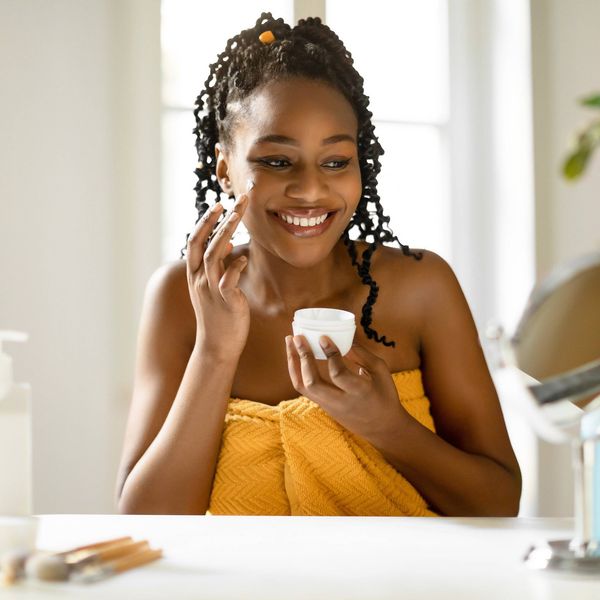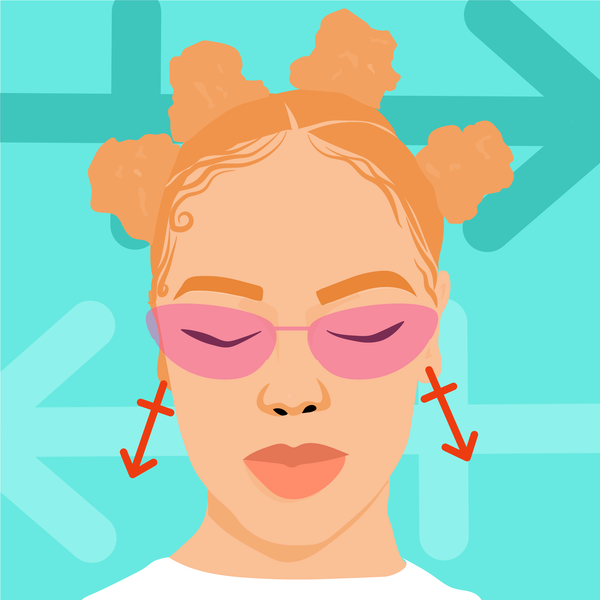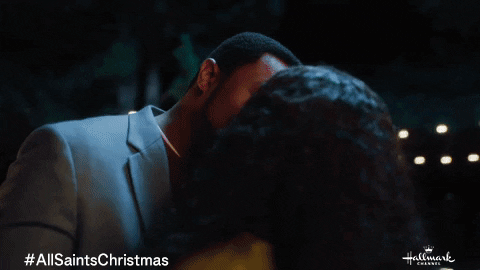
By now you’ve heard about Will Smith slapping Chris Rock at the Oscars after Rock told a bad joke related to Jada Pinkett Smith’s alopecia.
I’m less interested in talking about The Slap™ however and more interested in talking about something that happened mere moments later. A photo captured Will Smith being spoken to by Denzel Washington and Tyler Perry a few feet away from the Oscars stage during the first commercial break that came after the altercation.
There’s not much known to the public about what was said during the conversation aside from what Smith said during this acceptance speech when told the audience that Washington said “At your highest moment, be careful. That’s when the devil comes for you.” Reportedly Washington also went to comfort Pinkett Smith after speaking with Smith.
READ MORE: THE 94TH OSCARS BLACK HISTORY MOMENTS WE SHOULDN'T FORGET
It's a moment that’s gotten lost in all the chaos of the discourse that’s been generated after the events that unfolded. A moment of tenderness and love that resembles so much of what’s missing from the current conversation around Smith’s actions.
Regardless of how you feel about Smith’s action – disappointed, elated, angry, bemused – I’ve been frustrated about certain reactions that have fixated on wanting the actor to receive carceral punishment. Many people both in and outside the legal system view hitting someone without physical provocation to be illegal, punishable by imprisonment or at least some form of state sanctioned penalty such as probation or community service. But the calls to incarcerate Smith seem to ignore the fact that Rock has reportedly already declined to press charges against Smith, thus begging the question: who is it that we are protecting by insisting on carceral solutions if the person harmed here is not interested in pursuing any legal recourse?
The supposed violence people seem to be reacting to is not even the violence that allows for Rock to make a joke minimizing Jada’s health and using it as comedic fodder for a (mostly) white audience. The harm they’re reacting to has even less to do with Smith’s hand swiftly connecting to Rock’s face. It’s about forcing people to contend with impolite emotions and reactions in public. It’s the violence of violating the rule of civility in the face of oppression that white institutions such as the Oscars cloak themselves in. It’s evident by how many people have suggested that Smith should’ve just confronted Rock behind the scenes instead of on stage for all to see. Or how people who claim “violence is never the answer” can so easily suggest an inherently violent place like prison as a solution for every single problem that arises in our society. “Prisons do not disappear social problems, they disappear human beings,” as Angela Davis wrote.
If a Black man who has had a professional and personal reputation of being one of the nicest men in Hollywood for over the course of his three-decade career can immediately be villainized, I shudder at the thought of the way people are treating the Black boys and Black men in their everyday lives with considerably less social and monetary capital. Even the way white people continue to reconfigure Rock as a white person (“what if he were Betty White?!” What if he were Bob Saget?!”) in their supposed defense of Rock shows the limits of their concern and that they can’t even summon sympathy for the Black man that they’re claiming was harmed without casting themselves as the victims.
People struggle to imagine what accountability looks like without prisons but we must. Accountability in this situation could look like Smith, Pinkett-Smith, and Rock coming together to have a private conversation about what transpired and then bringing it to a public platform like Pinkett-Smith’s talk show Red Table Talk to have a discussion about alopecia, as well as ableism and misogynoir in comedy. And sometimes accountability looks like being pulled to the side by an elder like Washington that will gently but firmly correct you. Accountability is an act of love and community. And Sunday night showed us a brief glimpse of what that looks like.
Your December 2025 Monthly Horoscopes Are All About Surrender & Alignment
December is about letting go. We end the year with the need for more peace, reflection, and rejuvenation, and that is exactly what December is providing for us. The Sun is in Sagittarius, and anything is possible. This is the month to believe in that and to know that the universe is supporting you. With a Supermoon in Gemini as we begin the month as well, we have an opportunity to gain the closure we have been looking for this year and to wrap up old projects, ideas, and communication breakthroughs.
This is the month to make your peace the priority and let go of trying to control the way the tides are turning. Trust in your new beginning, and give yourself time to prepare for it this month.
A big part of the clarity that is coming through this month is due to Neptune going direct in Pisces on December 10, after being retrograde here since July. With Neptune now direct, we are able to see our inspiration and creativity a little more clearly, providing the perfect energy for dreams and manifestation to be built upon. The smoke is clearing, and it’s up to you to decide what you want to do with this newfound clarity that this transit is bringing. Mercury also moves back into Sagittarius on December 11, which is great for communication and clarity, and the adventures you were trying to see through at the beginning of November come around for you again with greater purpose and support.
On December 15, Mars enters Capricorn until the end of January 2026, and this is the extra push we need to make important changes and to be on the path towards greater abundance, stability, and prosperity. Mars in Capricorn takes care of business, and we have extra energy at our disposal during this time to do so. This transit is an ideal time to focus on your career or financial goals for next year and to start putting some of these plans into motion now. A few days later, we have the New Moon of the month, which will be in Sagittarius on December 19, and this is the perfect New Moon to manifest.
The energy is high, magic is in the air, and it’s all about moving forward with the new beginnings that are inspiring you and bringing you joy to think about right now.
Capricorn Season officially begins on December 21, and this earth sign energy is how we heal, gain closure, and build new foundations in our world. With Venus also moving into a Capricorn a few days later, there is something about peace, prosperity, and security that we are gaining in life and in love as we close out the year, and this is what we need right now. This month is about reflecting on what was, letting go of old hurt, and renewing. December is an ending and a new beginning in one, and there is magic in this space to be created.
Read for your sun and rising sign below to see what December 2025 has in store for you.
 AriesKyra Jay for xoNecole
AriesKyra Jay for xoNecoleARIES
December is a full-circle moment for you, Aries. You are seeing the gifts in your world and have a lot of gratitude for the way things have come about for you as of late. There are culminations in your world that are providing you with more abundance, stability, and community, and you are exactly where you are meant to be this month. With the Sun in a fellow fire sign and in your 9th house of travel for most of the month, December is a good time to get out of your comfort zone, explore the world around you, and get your body moving.
Mars, your ruling planet, also makes a change and moves into Capricorn on December 15, which will fuel your inspiration and power in your career space. You are making a lot of professional progress as we close out the year; however, make sure to be more mindful of your competitive drive right now. The New Moon on December 19 is the perfect opportunity for you to create some new plans and goals when it comes to traveling, education, and where you want to gain some new inspiration in your world. Overall, this is a month of things coming together for you serendipitously.
 TaurusKyra Jay for xoNecole
TaurusKyra Jay for xoNecoleTAURUS
December is about trusting your intuition, Taurus. You have a lot on your mind this month, and it’s best to delegate, communicate, and allow yourself some relief by opening up to someone and not feeling like you have to hold everything in. As we begin the month, we have a Supermoon in Gemini happening in your house of income, and the plans and projects you have been building here come to fruition for you now. This is the time to gain clarity on your financial world and to take a look at what spending habits you want to let go of here as well.
With Venus in your 8th house of shared resources for most of the month, you are doing a cleanse on your commitments, partnerships, and business ventures. You are taking a look at what you want to dedicate yourself to in the future, and what commitments you may need to let go of now in order to be in the space you truly want to be, both financially and within some of your relationship dynamics. Before we end the month, we have a New Moon in this same area of your chart, and it’s time to look at the opportunities that are presenting themselves and to trust your internal guidance system to lead you forward.
 GeminiKyra Jay for xoNecole
GeminiKyra Jay for xoNecoleGEMINI
You are moving forward fearlessly this month, Gemini. December is your month of love, passion, and dignity, and you are owning the light that you shine. We begin the month with the last Supermoon of the year, happening in your sign, and you are stepping up to the plate. You are showing up, owning how much you have grown this year, and allowing yourself to heal while also acknowledging that you have done your best and you deserve to have fun in the midst of the changes you are creating.
Mercury, your ruling planet, is officially out of retrograde, and you can use this energy to the fullest potential now. With Mercury in your 7th house of love, it’s time to speak from the heart and to talk about the things that matter and that are inspiring you right now to your loved ones. You never know what kind of epiphanies you may have when you open up the conversation to others. Before the month ends, you have a New Moon in this same love area of your chart, and this New Moon is all about manifesting romance, commitment, and abundance in your world.
 CancerKyra Jay for xoNecole
CancerKyra Jay for xoNecoleCANCER
December is an opening for more love, more joy, and more freedom in your life, Cancer. You have come to a place where you hold so much gratitude in your heart for where you are today and where your heart is shining, and things come together for you with more ease right now. With the Sun in your 6th house of health, work, and daily routines for most of the month, you are getting your ducks in a row while also putting more energy and effort into taking care of yourself, your priorities, and your well-being. This month surprises you in many ways, and it’s because you are showing up.
Mars and Venus both move into your house of love, relationships, marriage, and abundance this month, and you are making strides in your love life. You have both of these opposing forces on your side and are being recognized for the love you are while also receiving the love you want. This month, overall, is about focusing more on the positives in your world and letting your heart have its joy. Before December comes to an end, there is a New Moon in Sagittarius, and this is the perfect opportunity to create the plans you want to see through next year, especially when it comes to your work life, colleagues, business ventures, and health.
 LeoKyra Jay for xoNecole
LeoKyra Jay for xoNecoleLEO
The scales of karma are balancing, and they are balancing in your favor this month, Leo. December is your month of truth, and of seeing it clearly in your world. The Sun is in your house of romance, pleasure, and happiness for most of the month, and it’s time to relax, be in the present moment, and allow what is meant to be, to be. With a Supermoon in your 11th house of manifestation as December begins, this is a powerful month for seeing your dreams come to fruition, and for feeling like the intentions you have set this year are finally here for you now.
Mars also moves into your 6th house mid-month, and this is the perfect energy to have to move into the new year. You have extra energy at your disposal right now and are feeling fearless with what is possible for you and your daily routine. Before the month ends, we also have a New Moon in a fellow fire sign, Sagittarius, and this is a breakthrough moment for you and your heart. December, overall, wants to show you how loved and supported you are and will be doing so in magical, unexpected, and concrete ways.
 VirgoKyra Jay for xoNecole
VirgoKyra Jay for xoNecoleVIRGO
December is a month of victory, Virgo. You are showing up and experiencing some new successes in your world that move you forward on your path in life. With a Supermoon in your 10th house of career as we begin the month, the effort and intentions you have made this year come into full bloom, and you are being recognized for who you are and the good work you have done. This month is all about showing up and allowing yourself to be seen and loved, knowing that you deserve the support and opportunities you are receiving.
Mars moves into Capricorn on December 15, which brings the passion and excitement into your love life, hobbies, and little pleasures in life that light you up. You want to have fun this month and are going to be walking into the new year with this fearless, happy, and spontaneous energy within you. Before the month ends, Venus also enters Capricorn, and in this same area of your chart, you have a lot to look forward to and believe in right now. Overall, December wants you to be happy and will be doing everything possible to make that happen for you. This is your month to shine, Virgo.
 LibraKyra Jay for xoNecole
LibraKyra Jay for xoNecoleLIBRA
December is a month of opportunity for you, Libra. New doors open, and you are financially making breakthroughs this month because of it. December begins with a Supermoon in your 9th house, and you are getting a clearer view of where you have been making strides in your life and how it has all brought you here to this present moment of freedom. This month is showing you what happens when you are fearless with your purpose and when you believe in yourself and what you are worthy of.
Moving further into December, Mars moves into your 4th house of home and family mid-month, and you are closing out the year in your safe spaces. You are spending more time with your loved ones and taking the time to quiet your mind and listen to what your heart has been telling you. Before the month ends, we have a New Moon in Sagittarius, happening in an area of your life that deals with communication. This is a great time for getting the answers you have been looking for and for feeling more clear-headed and confident about the decisions you are making as you move into the new year.
 ScorpioKyra Jay for xoNecole
ScorpioKyra Jay for xoNecoleSCORPIO
Patience is a virtue this month, Scorpio. December is all about remaining patient and vigilant with what you are creating in your world, and knowing that the universe has your back. It’s time to be reminded of the power of hope, and this month is an opening to greater clarity in your life. There is a lot of energy in your financial zones right now, and this is providing you with new opportunities and new insight; however, the speed at which things come about for you may feel daunting. Keep your head up and eyes focused on what you want and know that you are more than worthy of receiving it.
With Mercury in your 2nd house of income this month, December is a good time to plant new seeds and to think about where you want to be financially a month from now or even a year. This month is asking you to think bigger and to think more long-term so that you can set the appropriate plans into motion now. We also have a New Moon in your house of income before the month ends, and this is when you will see more of your dreams come to fruition in this area of your life, and have more opportunities to build. Overall, December will be teaching you a lot, Scorpio.
 SagittariusKyra Jay for xoNecole
SagittariusKyra Jay for xoNecoleSAGITTARIUS
Sagittarius Season is here, and there is a lot in store for you this month, Sag. December is all about what you are dedicating yourself to. It’s about setting your intentions and putting the work in to back up your dreams, and about getting things in order so that when the new beginnings come, you are ready for them. The Sun and Venus are in your sign for most of this month, and there are a lot of eyes on you right now. You have the potential to create a new beginning for yourself, and it’s time to invest in yourself, your love life, and your dreams.
Mercury moves into Sagittarius on December 11, and this is giving you another opportunity to see through some of the plans that you had initiated in November. Mercury was retrograde in your sign last month, and there may have been some disruptions to your vision and plans for the future, and now this energy is turning around for you. Before the month ends, we also have a New Moon in Sagittarius, and you are walking through new doors fearlessly. You are catching others by surprise by your growth this month, and you are thinking a lot about your purpose, future, and plans for the new year.
 CapricornKyra Jay for xoNecole
CapricornKyra Jay for xoNecoleCAPRICORN
December is all about the vision, Capricorn. You are moving through a lot of changes and transformations this month, yet they are giving you a chance at a new beginning in the process. You are focused more on the future and what goals you want to manifest for yourself right now, and are ready to let go of what hasn’t been working for you. With the Sun in your 12th house of closure for most of December, this is your time for healing, but remember, healing doesn’t have to be isolating or boring; you can thrive while you renew, and you are this month.
Mid-month, the excitement picks up for you, and you are feeling more energized than you have in a while. Mars moves into Capricorn until the end of January 2026, and you are being proactive with your goals, intentions, and passions. You are a force to be reckoned with this month, and you are making things happen for yourself with confidence. Capricorn Season officially begins on December 21 this year, and this is definitely speeding up your healing process. You are breaking free from what was, and with Venus also moving into Capricorn before the month ends, you are leaving this year in high spirits and with love opening a new door for you.
 AquariusKyra Jay for xoNecole
AquariusKyra Jay for xoNecoleAQUARIUS
December is all about community, creativity, and manifestation, Aquarius. This is the month to work together with others to help bring your dreams to life. You are in a space of inspiration, empowerment, and beauty, and are creating more of this energy around you and in your world. Look out for what support comes your way this month and know that you don’t have to do everything alone to succeed. With the Sun in your 11th house of manifestation and friendship, your intentions are coming to fruition, and it’s time to celebrate with the people you love and to own how far you have come this year.
On December 19, we have a New Moon in Sagittarius, lighting up your life in all of the best ways possible. This is your New Moon of freedom, victory, and magic, and you are seeing new beginnings appear that you were once just hoping for. Before the month comes to an end, Venus moves into your 12th house of closure, and after an active and successful month, you are ready to relax, heal, and give your heart some of the attention it has been asking for. You are moving into the new year with the need to release and renew what hasn’t been working in your relationships, and you are finally ready to.
 PiscesKyra Jay for xoNecole
PiscesKyra Jay for xoNecolePISCES
December is a big month for you, Pisces. You are making some huge accomplishments this month, and are feeling like everything you have been through this year has been worth it for these moments that are coming to fruition for you now. The Sun is in your 10th house of career and reputation for most of the month, and this is where a lot of your focus is right now. You are claiming your successes and putting yourself out there in ways that not only serve you, but that inspire others as well.
Neptune officially goes direct on December 10, after being retrograde in your sign since July, and you are finally seeing things a little more clearly. You are feeling renewed inspiration and passion in your life, and your intuition is your strongest asset right now. Before December comes to an end, we also have a New Moon in your 10th house of career, and what happens now not only changes things for you in the present, but it also opens new doors and what is possible for you in the new year as well. Overall, you are on top of your game this month and are owning the joy and empowerment you feel.
Featured image by Kyra Jay for xoNecole
If there is one thing that I am going to do, it’s buy myself some scented soy candles. And, as I was looking at a display of them in a TJ Maxx store a couple of weekends ago, I found myself wondering just who decided which scents were considered to be “holiday” ones. The origin stories are actually pretty layered, so, for now, I’ll just share a few of ‘em.
I’m sure it’s pretty obvious that pine comes from the smell of fresh Christmas trees; however, scents like cloves, oranges, and cinnamon are attributed to two things: being natural ways to get well during the cold and flu season, and also being flavors that are used in many traditional holiday meals.
Meanwhile, frankincense and myrrh originate from the Middle East and Africa (you know, like the Bible does — some folks need to be reminded of that—eh hem — Trumpers) and ginger? It too helps with indigestion (which can definitely creep up at Thanksgiving and Christmas dinner tables); plus, it’s a key ingredient for ginger snaps and gingerbread houses. So, as you can see, holiday-themed scents have a rhyme and reason to them.
Tying this all in together — several years ago, I penned an article for the platform entitled, “Are You Ready To Have Some Very Merry ‘Christmas Sex’?” Well, in the spirit of revisiting some of that content, with a bit of a twist, I decided to broach some traditional holiday scents from the perspective of which ones will do your libido a ton of good from now through New Year’s Eve (check out “Make This Your Best NYE. For Sex. EVER.”).
Are you ready to check some of them out, so that, whether it’s via a candle, a diffuser, some essential oil, or some DIY body cream (check out “How To Incorporate All Five Senses To Have The Best Sex Ever”), you can bring some extra festive ambiance into your own boudoir? Excellent.
1. Vanilla
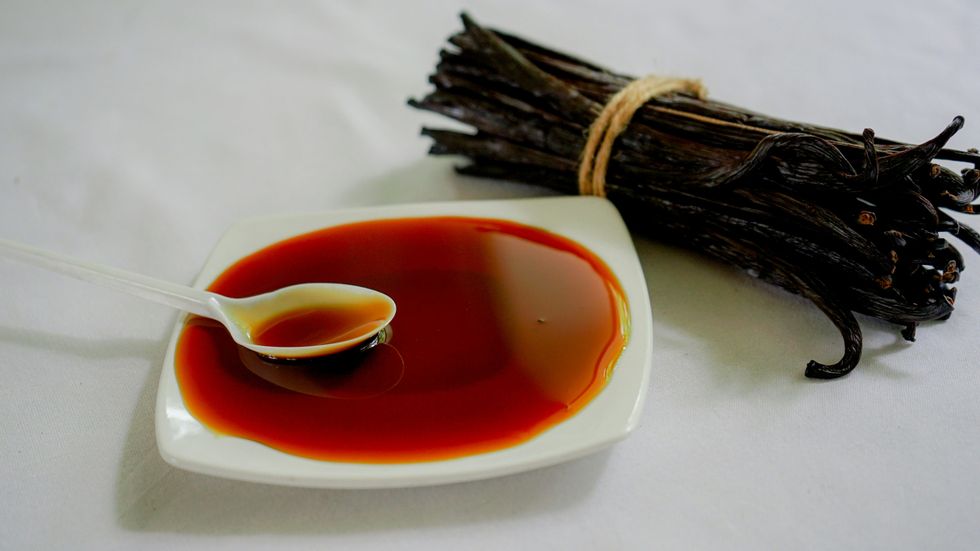
Unsplash
When it comes to holiday desserts, you’re going to be hard-pressed to find recipes that don’t include vanilla — and that alone explains why it is considered to be a traditional holiday scent. As far as your libido goes, vanilla is absolutely considered to be an aphrodisiac — partly because its sweet scent is considered to be very sensual. Some studies even reveal that vanillin (the active ingredient in vanilla) is able to increase sexual arousal and improve erectile dysfunction in men. So, if you adore the smell, here is more incentive to use it.
2. Frankincense
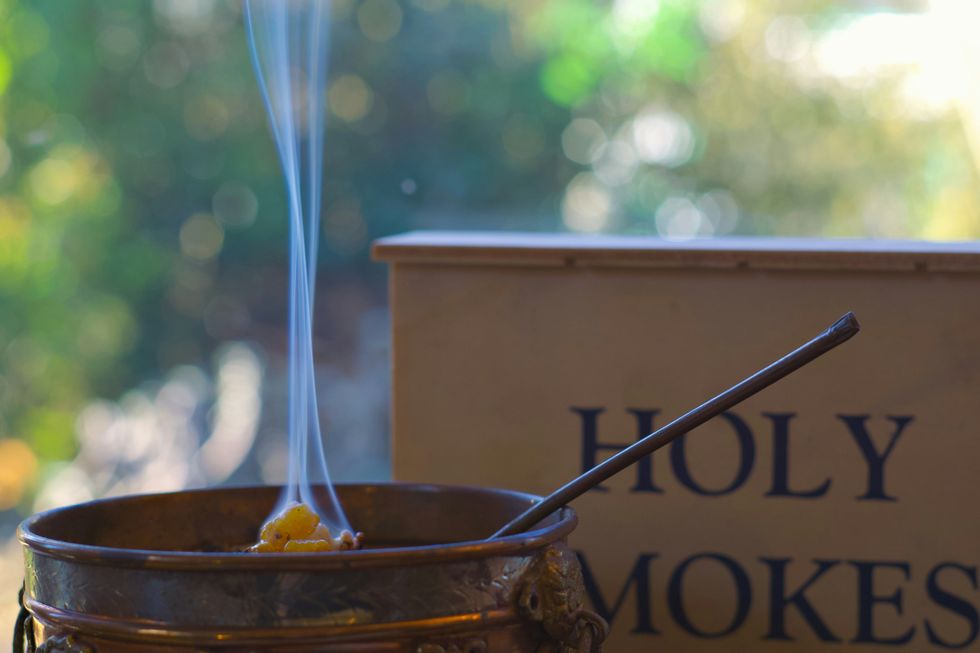
Unsplash
Although, typically, when people think about frankincense (and myrrh), it’s in the context of the gifts that the wise men brought Christ after he was born; it’s a part of the biblical Christmas story. However, frankincense goes much deeper than that. Sexually, since it has an earthy and spicy scent, some people like to use it to meditate (check out “What Exactly Is 'Orgasmic Meditation'?”). Also, since it has the ability to put you in a better mood, soothe and soften your skin and maintain your oral health — with the help of frankincense, every touch and kiss can be that much…sexier.
3. Cinnamon

Unsplash
I already gave cinnamon a shout-out in the intro. Personally, I’ve been a fan of it, in the sex department, for a long time now (check out “12 ‘Sex Condiments’ That Can Make Coitus Even More...Delicious”). When it’s in oil form, it can be very sweet to the taste while sending a warm sensation throughout the body — which is why the giver and receiver of oral sex can benefit from its usage. Beyond that, cinnamon helps to increase blood flow to your genital region, elevate sexual desire and, some studies say that it can even help improve fertility. Beautiful.
4. Peppermint
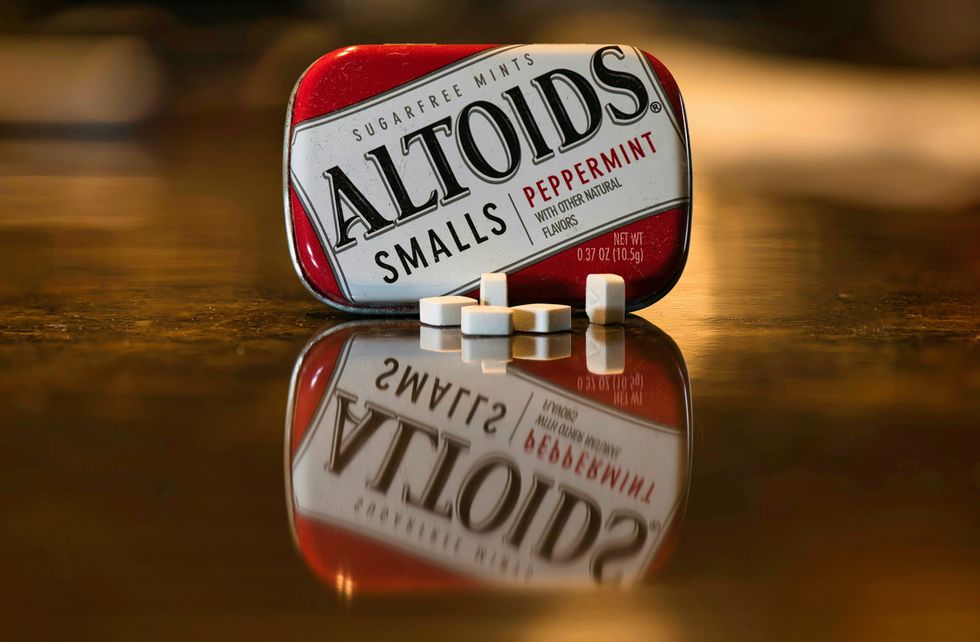
Unsplash
If there’s a signature candy for the holiday season, it’s probably a candy cane — which automatically puts peppermint in the running for being an official holiday scent. Pretty much, in any form, it’s got your sex life’s back because it’s hailed as being a sexual stimulant; in part, because its smell is so invigorating. Plus, it helps to (eh hem) ease headaches, it gives you more energy and it can definitely help to freshen your breath. Also, that minty sensation? The same thing that I said about cinnamon can apply to peppermint too (if you catch my drift).
5. Ginger

Unsplash
Whether it’s in a meal or in your bedroom, ginger is going to produce results that are hella spicy. On the sex tip, science has praised ginger for being able to increase sexual arousal, improve blood circulation (which intensifies orgasms) and strengthen fertility for many years. Scent-wise, I find it to be one that both men and women enjoy because it is both woodsy and sweet. So, if you’ve got some massage oil in mind, adding some ginger is a way to please you both.
6. Pomegranate

Unsplash
September through December is the time of year when pomegranates are considered to be in season. And, as someone who is a Rosh Hashanah observer, I have a personal adoration for them because I am aware of the various things that they symbolize in Hebrew culture including the fact that they are a fruit that represents love and fertility. So yeah, they would absolutely be an aphrodisiac — one that is perfect for this time of the year. While consuming it helps to boost testosterone levels in both men and women, the floral bittersweet smell that it produces can help to reduce stress while promoting relaxation (like most floral scents do) — and the more relaxed you are, the easier it is to climax.
7. Nutmeg
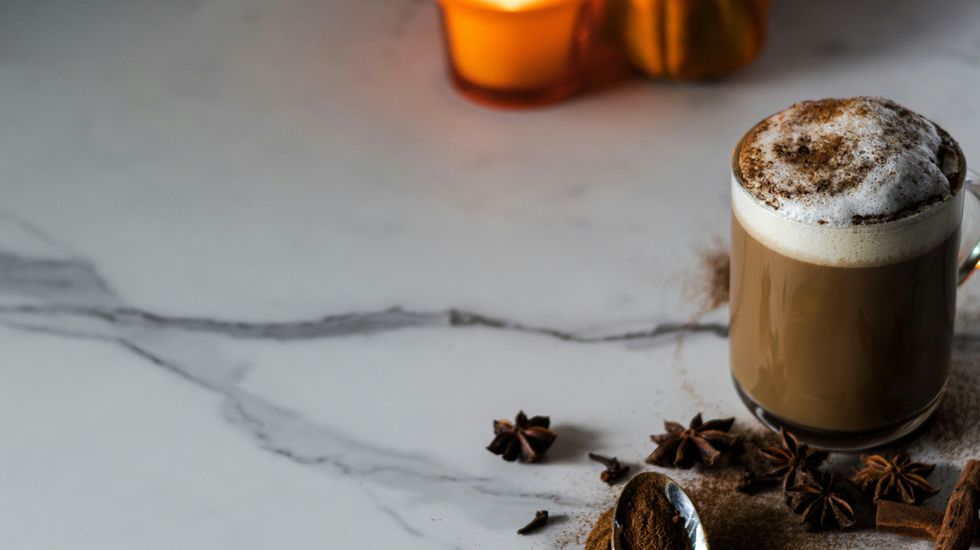
Unsplash
Another signature seasoning during the holiday season is nutmeg. It’s perfect in Thanksgiving sweet potato (or pumpkin) pie and Christmas morning French toast. And yes, it can also make your sex life better. If you consume it, it can intensify your libido and, overall, its warm-meets-spicy-meets-sweet smell is so inviting that it is considered to be a pretty seductive scent.
8. Cloves
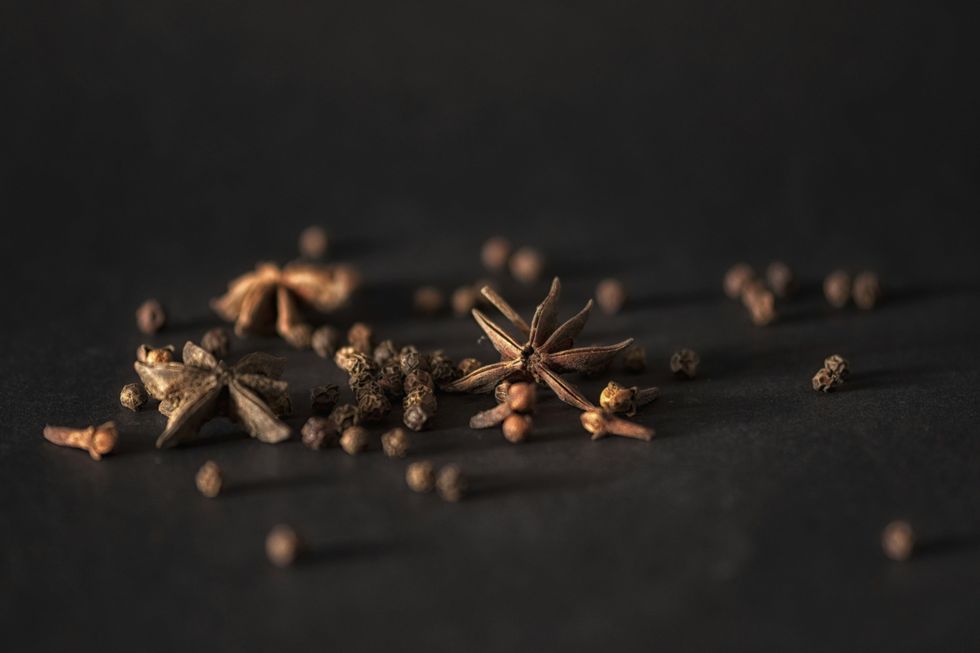
Unsplash
I ain’t got not one lie to tell you — if you’ve got a toothache, put some clove oil on that bad boy and send me a Christmas present for putting you on game. Aside from that, as I round all of this out, cloves are another holiday scent that can do wonders for your sex life. For men, it has the ability to significantly increase sexual arousal and improve stamina and endurance. For men and women alike, it also has a reputation for strengthening sexual desire. And for women solely? Well, if you want an all-natural way to increase natural lubrication down below — the scent and and feel (in DILUTED oil form) can make that happen. It can make the holidays especially special…if you know what I mean.
Ah yes — the atmosphere of the holidays and what it can do.
Take it all in! Scent ‘n whatever stimulating that comes with it! #wink
Let’s make things inbox official! Sign up for the xoNecole newsletter for love, wellness, career, and exclusive content delivered straight to your inbox.
Featured image by Giphy






